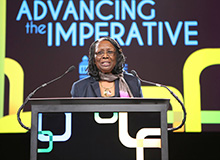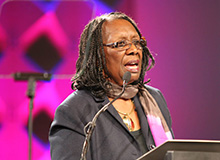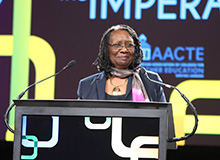01 Sep2015
By Angela Maynard Sewall
On Thursday, September 10, AACTE will offer the first free webinar in a series focused on preparing effective principals through collaborations among higher education institutions and school districts. Please register now to join us at 1:00 p.m. Eastern!
The webinar, Principal Pipeline Initiative: Laying the Foundation, is offered with support from the Wallace Foundation as part of its multiyear effort to strengthen the development and support of principals in large urban districts. For this webinar, participating district representatives will be on tap to provide their insights and to engage in discussion with a faculty member from a higher education institution to compare their experiences and to discuss goals and results from the partnership work.
24 Aug2015
By Debbie Mills, Diane Yendol-Hoppey, Rebecca West Burns and Woodland Johnson
The views expressed in this post do not necessarily reflect the views of AACTE.
Teacher education is entering an exciting era. Scholars and practitioners alike are calling for teachers to be educated differently (AACTE, 2010; CCSSO, 2015; NCATE, 2010), which means that the way we prepare teachers and the way we support teachers’ ongoing professional development must change. In lieu of one-size-fits-all, “sit and get” training sessions, teachers’ professional development must be ongoing, differentiated, sustained, and rooted in issues that they face on a daily basis. Such is the experience for the teachers of Mort Elementary School in Hillsborough County Public Schools (the 8th largest school district in the United States) who participate in the Mort Teacher Leader Academy (MTLA).
04 Aug2015
By Sharon Robinson and Joe A. Hairston
As the first cohort of leaders embarks on their course of study with the new AASA Urban Superintendents Academy at Howard University and the University of Southern California, we are thrilled to see this promising work come to life. Urban districts desperately need forward-thinking leaders, particularly those from underrepresented demographic groups, prepared to be barrier-busting champions for every student in their care.
Following an intensive kick-off conference later this month, participants in the Academy—predominantly from underrepresented racial/ethnic groups—will spend the academic year undertaking internships in the field, focusing on problems of practice under the guidance of experienced mentors, and taking graduate courses at the university before completing culminating projects. These participants, in-service administrators who want to enrich their field experience and training for urban settings or prospective superintendents, will be prepared for certification through the program.
What is so promising about the Academy?
13 Jul2015
By Angela Maynard Sewall
Beginning this fall, AACTE will host a series of four free webinars on preparing effective principals through collaborations among higher education institutions and school districts.
The webinars will feature participants in the Wallace Foundation’s Principal Pipeline Initiative, a multiyear effort to strengthen the preparation and support of principals in six high-need urban districts: Prince George’s County (MD), Charlotte-Mecklenburg (NC), Denver (CO), New York City, Hillsborough County (FL), and Gwinnett County (GA).
The initiative, for which AACTE has served as a communications partner, builds on over a decade of research that identified four key parts of a pipeline to develop successful principals: rigorous job requirements, high-quality preparation, selective hiring, and on-the-job evaluation and support.
09 Jul2015
By Kayla Campbell
As a recipient of federal Teacher Quality Partnership grants over the past 6 years, Wichita State University (WSU) in Kansas has proven the value of investing in innovative educator preparation practices.
The Wichita Teacher Quality Partnership (WTQP) created extensive field-based learning experiences that prepare diverse and highly qualified teachers for urban school settings. Through the application of the professional development school (PDS) model in particular, the initiative fostered partnerships among the Wichita Public Schools (including 26 urban schools), The Opportunity Project (an early learning center), Head Start programs, local community colleges, and the College of Education at WSU.
02 Jun2015
By Tim Finklea

On May 26, the College of Education at William Paterson University (NJ) brought together university, school, and community members for a very special event organized by Candace Burns, dean of the college, and Sharon Leathers, director of educational innovations and grant initiatives. I was privileged to participate along with my colleague Rodrick Lucero, AACTE’s vice president for member engagement and support.
The event centered on the award-winning documentary American Promise, which follows two African American boys through 13 years of schooling in a unique coming-of-age film. Around the country, internationally, and through the PBS network, this amazing film has provoked new conversations and raised difficult questions about what the promise of education means in America, particularly for children of color.
15 Apr2015
By Etta R. Hollins and Rodrick Lucero
The following letter to the editor was published today in Education Week.
There are kids entering urban classrooms every day hungry, sad, tired, and angry. Name an obstacle to learning, and most urban teachers have seen it play out firsthand among their students.
In January, the Horace Mann League of the United States released School Performance in Context: The Iceberg Effect, a report on the “unparalleled levels” of poverty, inequity, and violence faced by U.S. students. Though outside factors such as these are not the reason for increasing gaps in achievement, they’re barriers teachers must understand and address to have an impact on student learning.
07 Apr2015
By Etta R. Hollins

Editor’s Note: Professor Hollins inspired attendees of AACTE’s recent Annual Meeting in Atlanta during the Speaker Spotlight Session. (View a video recording of her speech here, and read another version in this Hechinger Report piece, which includes the video she played during her address.) To follow up on her presentation, we invited Hollins to explore her topic in a series of blogs for Ed Prep Matters. This is the final post in the series.
Most teachers in urban schools, as elsewhere, are dedicated professionals who put much effort into their practice and care deeply about the students they teach. Teachers understandably feel frustrated when their students fail to meet expectations for learning outcomes. How they address this frustration, however, makes all the difference for student outcomes—and it is influenced heavily by the ideology developed in their school’s professional community.
31 Mar2015
By Etta R. Hollins

Editor’s Note: Professor Hollins inspired attendees of AACTE’s recent Annual Meeting in Atlanta during the Speaker Spotlight Session. (View a video recording of her speech here, and read another version in this Hechinger Report piece, which includes the video she played during her address.) To follow up on her presentation, we invited Hollins to explore her topic in a series of blogs for Ed Prep Matters. This is the second post in the series.
Teaching is an interpretive practice that requires knowledge of the community where students grow and develop, and where they are socialized. Students’ initial and ongoing learning happens within a particular community; is framed by the ideologies and practices of the community; is influenced by the experiences, interests, and values shared among members of the community; and is appropriated through the learner’s perception, which is developed within the particular community. The initial learning that happens within a community constitutes the intellectual, psychological, social, and emotional development of the individual person.
18 Mar2015
By Etta R. Hollins

Editor’s Note: Professor Hollins inspired attendees of AACTE’s recent Annual Meeting in Atlanta during the Speaker Spotlight Session. (View a video recording of her speech here, and read another version in this Hechinger Report piece, which includes the video she played during her address.) To follow up on her presentation, we invited Hollins to explore her topic in a series of blogs for Ed Prep Matters. This is the first post in the series.
The way teaching and learning teaching are conceptualized influences approaches and practices in both. For example, where teaching is viewed as an interpretive process, learning teaching also requires an interpretive process for constructing the habits of mind and deep knowledge of approaches and practices necessary for facilitating meaningful, purposeful, and productive learning experiences for students in different contexts, from different cultural and experiential backgrounds, and with different developmental needs.
24 Feb2015
By Lucy Berrier

At this year’s Annual Meeting in Atlanta, AACTE is proud to partner with a local organization, Arts for Learning, to give back to the surrounding community. Look for the designated table beside the AACTE Resource Center outside the Conference Community Center.
Arts for Learning at the Woodruff Arts Center aims “to transform the lives and learning of young people through the arts.” It is an affiliate of Young Audiences, Inc., the nation’s largest source for arts-in-education services, and reaches preschool through high school students. According to its web site, the organization’s “performances, workshops, and residencies encompass a wide variety of art forms, genres, and cultural traditions in the visual, performing, literary, and media arts.” Arts for Learning serves more than 200,000 PK-12 students annually in hundreds of schools across Georgia, with targeted supports for classroom teachers to implement arts-integrated instructional strategies, particularly those focused on literacy.
19 Feb2015
By Kristin McCabe
AACTE’s Committee on Global Diversity has selected Texas Christian University’s College of Education to receive the 2015 AACTE Best Practice Award in Support of Multicultural Education and Diversity. The award will be presented at the 67th AACTE Annual Meeting Speaker Spotlight Session, Sunday, March 1, at the Atlanta Marriott Marquis.
The university’s robust Early Childhood Through Grade 6 Program (EC-6) is the particular target of AACTE’s award, with a focus on diversity broadly conceived. Students in this program–who predominantly come from middle-high socioeconomic, monolingual backgrounds and initially expect to teach in schools with similar demographics–develop knowledge, skills, and values to effectively work in high-need settings by serving as a bridge between home and school while academically challenging all children for success.
18 Feb2015
By Kristin McCabe
AACTE will honor authors Kavita Kapadia Matsko of the University of Chicago and Karen Hammerness of the American Museum of Natural History with the 2015 AACTE Outstanding Journal of Teacher Education (JTE) Article Award for their article “Unpacking the ‘Urban’ in Urban Teacher Education: Making a Case for Context-Specific Preparation,” published in the March/April 2014 issue of the journal. The award will be presented at the 67th AACTE Annual Meeting Welcoming Session, Friday, February 27, at the Atlanta Marriott Marquis.
17 Feb2015
By Kabba Colley, Kathryn C. McGinn and Anthony Pittman
Editor’s Note: AACTE’s two Research Fellowship teams will present a joint session at the Association’s Annual Meeting, Saturday, February 28, at 1:30 p.m. in Room A704 of the Atlanta Marriott Marquis. This post provides background on the fellowship based in New Jersey at Kean University, Rowan University, and William Paterson University.
Is there a difference in teacher persistence in urban districts attributable to specific pathways? Why do teachers say they persist in urban districts? Researchers from Kean University, Rowan University, and William Paterson University came together to explore these and other related questions as part of the AACTE Research Fellowship.
25 Nov2014
By Kristin McCabe
A study of 30 teacher residency programs funded through the federal Teacher Quality Partnership (TQP) Program finds that graduates of the residencies feel more prepared at the start of their careers and more supported during their time in the classroom than their same-district peers from other pathways.











